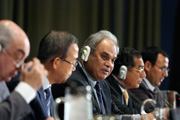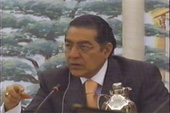 PANEL 1 - Scaling up finance to transform agrifood systems: accelerating opportunities for employment and entrepreneurship Excellencies, distinguished delegates, I am honored to deliver this statement on behalf of the G77 and China. At the outset, I wish to thank the panelists for their insightful contributions to this interactive dialogue. Enhancing agrifood systems into efficient, inclusive, and resilient systems is central to poverty eradication and sustainable development as well as to address the root causes of hunger and all forms of malnutrition. For developing countries, agrifood systems are also a major source of employment, livelihoods, and structural transformation, and as such, drivers of development and economic prosperity. However, financing gaps remain wide and persistent, with international financing for food security remaining significantly below the levels required to address the growing impacts of disasters and climate variability. The Group underscores that scaled-up, predictable, and accessible financing -including climate finance- is indispensable. We call upon international financial institutions to find urgent, affordable, and timely solutions to support developing countries, particularly those highly indebted. Multilateral development banks must strengthen support in alignment with national priorities, while fully respecting national ownership. There is no "one-size-fits-all" pathway to improvement or transformation. The Group recognizes that public development finance remains critical and notes the complementary role that public sector-led blended finance can play in crowding in critical private capital for agrifood systems, particularly in last-mile financing. Such approaches must be transparent, accountable, and demonstrably aligned with development outcomes, particularly for smallholders, women, youth, Indigenous Peoples, local communities, and rural micro, small and medium enterprises, while remaining consistent with relevant international rules and commitments. The Group calls for the strengthening of agrifood systems through an inclusive approach and emphasizes the need to revitalize the agriculture sector and promote rural development. By scaling up investments in agricultural education, digital literacy, entrepreneurship and information and communications technology, and through the facilitation of agricultural trade, we can create decent jobs for young people, ensuring food security and nutrition in a sustainable manner. Financial inclusion is essential. We must ensure that small-scale producers have access to affordable credit and risk-management tools. The group calls for increased participation and access of developing countries to emerging technologies, including Artificial intelligence, and to further expand capacity building programs in agro-technology. We also reaffirm the need to significantly increase investment in research and innovation in food, nutrition and agriculture, in order to enhance productivity, sustainability and resilience. Finally, the Group reiterates its deep concern over the adverse impact of unilateral coercive measures that are not in accordance with international law and the Charter of the United Nations, which hinder the capacity of affected developing countries to improve their agrifood systems, and calls for the immediate cessation of these measures. With adequate means of implementation and respect for national priorities, agrifood systems can become powerful engines for inclusive growth, fostering entrepreneurship and decent employment for all. I thank you. Mr. Vice President, From the onset, I wish to thank you for your efforts in the preparations thus far for the forthcoming 2026 ECOSOC Operational Activities for Development Segment (OAS), noting that it is the only designated segment in ECOSOC to discuss and address the challenges and gaps the UN development system faces, while providing oversight on that system. Firstly, the Group of 77 and China reiterates the need for the focus of the OAS to be development-center, with the eradication of poverty in all its forms and dimensions as the guiding light of the development agenda, and therefore the programme should reflect this, especially, considering the immense challenges currently facing the development agenda. Mr. Vice President, We also continue to call for the panels to be smaller and more focused, so that they allow for more interactive engagement with the Member States, and to be able to provide responses to any questions and clarifications posed. With only four years remaining to our 2030 deadline, it would be important that some discussion center around those programme countries that are most likely to be left behind and the way forward. Mr. Vice President, The Group attaches great importance to the need to provide sustainable, predictable, and adequate funding to the United Nations Development System and its Resident Coordinator system. We cannot expect the system to operate and deliver the type of service we require to accelerate implementation of the 2030 Agenda with inadequate resources. In the same vein, we must address other significant obstacles such as debt, climate change and the imposition of unilateral coercive measures, which disproportionately affect developing countries and hinder the work of UN country teams on the ground. Noting the current geopolitical and financial situation, especially affecting the development pillar, it is crucially important that we discuss this in the context of how the UN development system can implement its mandates from the 2024 QCPR, and therefore, it would be critically important that Member States receive the reports of the Secretary-General and the Chair of the DCO in a timely manner to inform and enrich our discussions. The Group reiterates its support for the UN80 Initiative and its objectives of enhancing efficiency, coherence, and responsiveness across the UN system. At the same time, we stress that reform efforts must not undermine development mandates, institutional expertise, or equitable geographical representation across all pillars of the United Nations, nor pause or interrupt on the ground delivery. It would therefore be valuable to have a specific dialogue to hear the views and receive detailed information from relevant UN Entities and Resident Coordinators on the UN80 Initiative proposals, including the proposed mergers and alternative options, the UNCT Reconfiguration and the Regional Reset and other major reform proposals, to inform our intergovernmental negotiations. The Group also calls for a dedicated segment to receive an update on how the relevant UN entities and main stakeholders are implementing the mandates arising from the Sevilla Commitment and supporting efforts by developing States in that regard, while underscoring the importance of its full and timely implementation. Mr. Vice President, the Group looks forward to receiving your proposed draft programme, and calls for adequate time for it to be reviewed and feedback given before its finalization. Please be assured, Mr. Vice President, of the Group of 77's constructive, full, and meaningful participation in this matter. You can also be assured that the Group stands ready as the penholder of the draft resolution for the Segment to work with our developed partners to have an action oriented and concise resolution, and calls on them to cooperate to make this year's operational segment a success. I thank you. Excellencies, distinguished delegates, I am honored to deliver this statement on behalf of the G77 and China. At the outset, we welcome the Secretary-General's recommendation contained in document A/80/619 for the appointment of the members of the Independent International Scientific Panel on Artificial Intelligence for a three-year term. The Group has always emphasized that the selection process for the Independent Panel should be transparent, inclusive, and merit-based, while ensuring regional and academic diversity. The Group reiterates that the Independent Panel must be a multidisciplinary, evidence-based, and representative body that provides policy-relevant scientific assessments on the risks, opportunities, and governance of artificial intelligence, as well as impartial and evidence-based advice aimed at ensuring fair, equitable, enabling, and inclusive access to AI. Developing countries must be empowered to benefit from such impartial scientific guidance in order to foster technological autonomy, seize opportunities, manage risks, bridge capacity gaps, and design national policies that are knowledge-driven and equitable. Throughout this process, we have consistently underscored the urgent need for comprehensive international frameworks that guarantee the full inclusion of developing countries in shaping the future of AI governance. These frameworks must uphold the principles of national sovereignty, equity, and transparency. To ensure that no country is left behind, cooperation must prioritize capacity-building, affordable and sustainable financing, technology transfer, fair, inclusive and equitable data governance and access to data, and the strengthening of South-South and triangular cooperation. These efforts should both accelerate innovation and help narrow digital and developmental divides. If governed properly, AI could unlock new opportunities for improving public services, expanding access to education and health, enhancing digital economies, and accelerating the achievement of the 2030 Agenda. The Group reaffirms that the Independent Panel should align with existing UN initiatives, through coordinated efforts, ensuring coherence, systematic capacity-building, and global AI governance alignment. The Independent Panel should also be linked to the Global Dialogue on Artificial Intelligence Governance, with the Panel's findings informing the policy discussions of the Dialogue. To conclude, the Group expresses its support to the recommendation as presented by the Secretary General on document A/80/619 and regrets that a vote has been called on such an important matter. The Group of 77 and China reaffirms its commitment to ensuring a fair, inclusive, transparent, and equitable approach to AI governance. The success of these efforts will depend on fostering international cooperation, ensuring equitable access, promoting shared prosperity, bridging and preventing the widening of existing digital divides, and ensuring that AI serves as a tool for sustainable development for all. I thank you. 31st Annual Meeting of Ministers for Foreign Affairs (27 September 2007)
Press Briefing by G-77 Chairman at the 41st G-77 Chapters Meeting (26-27 February 2007)
Press Conference by G-77 Chairman on G-77 Agenda and UN Reform (20 February 2007)
|
|||||||

 Print
Print
 RealPlayer
RealPlayer


